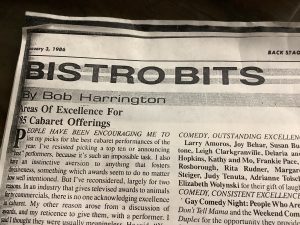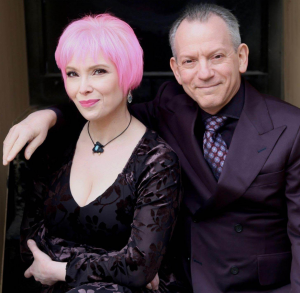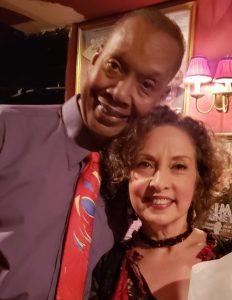Bistro Bits: A Greeting—Plus, What Makes for Super-Great Cabaret?
As you may have noticed, cabaret singers customarily perform two songs before greeting their audience at the top of a show. Occasionally, though, a performer will break the unwritten rule and make opening remarks after the first song.
I’ve decided to follow that bit of “alt” protocol and extend a greeting now, at the top of what is my second installment of the rebooted “Bistro Bits” column.

column the first Bistro Award recipients There were 125 names listed.
The original “Bistro Bits” was written by the late Bob Harrington. It appeared in the pages of the theatrical trade paper Back Stage. The idea for the column was suggested to him by the paper’s editor, our own Sherry Eaker. Harrington also established the Bistro Awards in the pages of Back Stage. His name is invoked at the awards show each year when the Bob Harrington Bistro Award for Lifetime Achievement is presented.
Of course, I feel honored, humbled, and excited to take on the challenge of creating new editions of “Bistro Bits.” They’ll appear in these online newsletters every couple of weeks, and afterward they’ll live at BistroAwards.com. Sherry has encouraged me to experiment a bit in order to find a format for the column that works for me (and for you)—so thanks for joining me in the lab while I sort out the test tubes and petri dishes.
Sherry also suggested that I think about (and explain) what it is that I personally value in the art of cabaret. So after some thought, I’m naming three things that I always hope will emerge in any cabaret show (or any jazz show or comedy show) that I see:
–Surprise
–Engagement
–Resonance
Apropos of whatever, the names of these components create the acronym “SER”—which, in Spanish, is the verb “to be.” (If I’d gone with “Surprise, Engagement, and Xylophones,” I would have had a much catchier acronym. But, honestly, “Xylophones” wasn’t even in my top twenty.)
Anyway, let me elaborate a bit on these hallmarks of cabaret excellence….
Surprise
- “Send in the Clowns” reimagined as a polka? Hmm.
- That’s her brand? Three oboists and a bongo guy?
- Not sure how I feel about “So Long, Dearie” as an opening. number.
No, not all surprises are good ones. Some are just plain alarming: a skunk in the breakfast nook. And also, there are perfectly wonderful shows that give listeners just what they expect—no frills, thrills, chills, or spills. Those shows are comfort food, and we can all use a bit of that now and then.
Still, isn’t it at least usually good to stir the pot a time or two during a show, maybe tossing in a savory new ingredient?
Just days ago, I saw Mardie Millit and Michael Garin’s show Sorry-Grateful: One Sondheim Story in Letters and Song at Don’t Tell Mama, directed by Eric Michael Gillett. The bulk of the show featured Millit eagerly sharing with us the story of her intriguing, decades-long correspondence with Stephen Sondheim. She interspersed her spoken patter with her personal interpretations of Sondheim classics, including lesser-known songs (“Uptown, Downtown,” “Goodbye for Now”), alongside the ones every cabaret-goer and musical-theatre geek knows.
For me, the most memorable, surprising sequence in that show focused on Millit’s spouse, Garin, at the piano, performing an idiosyncratic instrumental take on “Losing My Mind” (from Follies) in a mashup with the Supremes’ 1965 super-hit, “Stop in the Name of Love.”
Garin had teased us with the idea that he was about to play an unnamed Sondheim song with a treatment that was very “Detroit.” The juxtaposition of the two songs provoked a burst of delight as we realized what the paired melodies were and, also, how naturally and comfortably they meshed when outfitted with Garin’s upbeat, Motown-ish arrangement. An additional kick was the dawning realization about the thematic kinship of the two songs. After all, the love that threatens to break your heart can also be the love that makes you lose your mind. (Think it oh-over.)
So, that’s the first element. In the spirit of Sophocles’ Oedipus Rex, and in the words of Gomer Pyle: “Surprise, surprise, surprise!”
Engagement
In storyteller/comedian David Dean Bottrell’s recent show at Pangea, The Death of Me Yet, he told a succession of anecdotes about brushes he’s had with death—his own possible death as well as the actual ones of a friend and a relative.
Or, I should have said, he began by telling partial anecdotes. Just as Bottrell neared what seemed to be the turning point of a story, he would snap his fingers, and the Pangea stage would go dark. When the lights came back up, seconds later, he would move on to a different personal memory. Soon he’d given us the beginnings of a handful of rather disturbing tales, repeatedly leaving himself hanging on the precipice of demise, like TV’s Batman and Robin on a Wednesday evening in 1966. (“Tune in tomorrow…same Bat Time….”)
The element of surprise was baked into the show’s structure, of course—in this case, the surprise of interruption. The cliffhanger is a familiar device, but it’s not every day that someone lines up a series of cliffhangers for an audience.
Crucially, though, how was Bottrell going to wrap this whole thing up? Would he ever return to the narratives he’d started? How many more of these anecdotes would follow? Logic told us that he would not meet a horrific death at the conclusion of any of these stories, because there he was on the stage, in the flesh, still talking to us and still snapping his fingers. But he’d drawn us into a puzzle by this point, and we’d now all donned our thinking caps in order to figure it out. (In the end, much of the mystery was cleared up, but some elemental questions were left unanswered. Little questions like…what is death, anyway?)
Bottrell’s gift for suspense demonstrates one kind of engagement: engagement with the audience. But a performer’s commitment to the material—the songs, stories, and other patter that’s shared with listeners—that’s another aspect.
One of my favorite cabaret moments in recent weeks was a song presented in Debra Vogel’s Don’t Tell Mama show, It’s a Jungle Out There (directed by Elfin Frederick Vogel, with choreography by Nora Brown). This was a Tom Waits song called “The Piano Has Been Drinking,” presented by Ms. Vogel in a wildly physical duet with the evening’s gifted musical director and pianist Darryl Curry. After seeing the show, I listened to the Waits version online. Singer Waits had first dibs on Songwriter Waits’s composition, of course, so, technically, he owns it. But the recording disappointed me. Waits’s drunkard character didn’t seem particularly funny, fascinating, or pathos-packed.
The premise of this song is that the singer/protagonist takes no responsibility for any out-of-control, substance-inspired misbehavior. The piano, the jukebox, the carpeting, the balcony—they’re the culprits that are ruining everything. The singer is just trying to maneuver through the chaos.
Vogel and Curry did not just enact a series of stereotypical drunken behaviors, though both of them did make some bold vocal and physical acting choices. They seemed fully committed to their actions, fulfilling them with conviction. Each of their characters was stuck in a personal fog bank thanks to one too many a martooni. But each was also egging the other on with lamentations about the outrages that the furnishings were perpetrating. The performers seemed to me a pair of innocents: animated cartoon cuckoo-birds struggling to migrate through choppy weather. Lucy Ricardo, striving in vain to pitch Vitameatavegamin, oblivious to its secret ingredient.
These performers pulled us into a wonderful few minutes of inebriation…and with no looming hangover!
Resonance
I’m not thinking about vocal reverberation when I talk about “resonance”—although that’s an important component of cabaret singing too. I’m talking about what might be called brain echoes: moments that resonate in the mind’s eye and mind’s ear, sometimes long after a performance has concluded. Not all cabaret turns, even the ones that effectively surprise and engage us, will necessarily linger in our psyches. But when they do linger, it’s enriching: one of the best things ever.
Certain moments in a show will strike a chord with certain audience members but won’t have the same effect on others. There are times, though, when a song, a story, or maybe just a small scrap of patter achieves a kind of communal resonance.
A couple of weeks ago, I seem to have witnessed such a moment, during a song sung by Jeanne MacDonald at Chelsea Table + Stage, in a show called Heart & Soul (musical direction by Tracy Stark). The song was Dar Williams’s “You’re Aging Well.” (You may know Williams from the brilliant “When I Was a Boy,” a feminist story- song that has become a go-to title for women in cabaret .)
“You’re Aging Well” looks at how growing older can make a person fearful and angry. But, as Williams’s lyrics suggest, such embitterment isn’t an inevitable progression:
…In the morning, you wake up and the signs point to you.
They say:
I’m so glad that you finally made it here,”
“You thought nobody cared, but I did, I could tell,”
And “This is your year,” and “It always starts here,”
And oh, “You’re aging well.”
This song was originally recorded when Williams was only in her mid-twenties. It has certainly grown more poignant with the passing years.
And what a fine song it was for MacDonald (a singer who, before this show, had been away from NYC clubs for several years) to include in a “comeback” presentation. Her knack for shading and then brightening the musical phrases was accomplished in part through her subtle-but-sure control of volume. The number was a bit of triumph for her, and an emotional boost for her listeners.
MacDonald’s audience had responded favorably throughout the evening. But their reaction to “You’re Aging Well” was especially strong, perhaps because the song prompted contemplation of things we’ve all experienced in the past few years—things to which our deepening crow’s feet will attest: time lost to pandemic worries, political chaos, wars, and climate catastrophes, as well as time spent with more ordinary nuisances. (Not to mention ordinary joys!) As with other songs celebrating human resilience—“I’m Still Here,” “Here’s to Life,” Leonard Cohen’s “Anthem”—the resonance in Williams’s song will only become more meaningful in years to come.
And, truly: Who—at age 25 or age 95—doesn’t want to be told, “You’re aging well,” whether it’s God’s honest truth or a lovely snow-white lie?
// // //
So there you have it, readers-who’ve-come-this-far. Surprise, Engagement, and Resonance. Not the be-all and end-all of cabaret artistry by any means, but they’re a start.
I mean, we’re still experimenting, right? Here in the laboratory?
Great! Could you hand me that Bunsen burner, please?
About the Author
Mark Dundas Wood is an arts/entertainment journalist and dramaturg. He began writing reviews for BistroAwards.com in 2011. More recently he has contributed "Cabaret Setlist" articles about cabaret repertoire. Other reviews and articles have appeared in theaterscene.net and clydefitchreport.com, as well as in American Theatre and Back Stage. As a dramaturg, he has worked with New Professional Theatre and the New York Musical Theatre Festival. He is currently literary manager for Broad Horizons Theatre Company.








